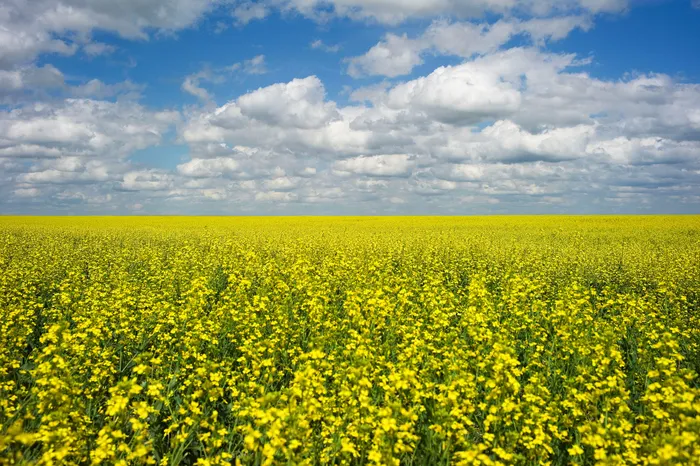Zeder reports 21.9% decline in net asset value after lower investment valuations
INVESTMENT

Canola crop used for making cooking oil. Zeder Investments subsidiary Agricol delivered solid results in the six months to August 31, 2025, despite a below-average 2024/2025 sunflower season. Diversification to include maize, soya, wheat and canola mitigated the impact of a disappointing sunflower season.
Image: Supplied
Zeder Investments’ share price increased 5% on the JSE Tuesday morning even though it reported a 21.9% decline in net asset value to R1.68 per share in the six months to August 31.
The JSE-listed company said in results released Tuesday the drop in net asset value mainly arose from a 31 cents a share special dividend and a downward adjustment in the valuation of its unlisted investments. The share price traded at R1.26 per share - a year it was at R1.95.
The headline loss per share surged by 143.9% from 4.1 cents to 10 cents, mainly as a result of the downward valuation adjustments, countered by dividend income received.
The investment in Zaad, which invests and operates in the specialised agri-inputs industry, with a focus on emerging markets, particularly in Africa, the Middle East, and Eastern Europe, was revised down to R2 billion from R2.16bn at the end of February 2025, while the stake in Pome Investments was revised down to R65 million from R119m.
The interim pre-tax loss from continued operations increased by 107% from a loss of R71m to R147m. No dividends were declared during the six months.
Advanced discussions were underway with third parties on subsidiary Zaad, and the board continued to assess further wealth-maximising strategies, they said.
Zeder announced on March 26, that a separate sale of shares agreement had been entered into with ETG Inputs to dispose of operations in Zimbabwe, Mozambique, and Zambia, including intellectual property rights held by Bakker Brothers in the Netherlands, as one indivisible transaction, for R135m.
In addition, Zaad also entered into an agreement to dispose of its non-core Angolan chemical operations for R45m. The transaction was still subject to approvals from the competition commission.
“The macro environment remained constrained, primarily due to ongoing global market risks and conflicts in the Middle East and Eastern Europe. Zeder anticipates that uncertainty and volatility will persist in these operating markets,” the board said.
In terms of the remaining portfolio investment, “exciting new growth markets have been established on the seed and chemical side of our South African operation, while EA Seeds has promising growth prospects in the Eastern African markets, especially in the hybrid seed maize market.”
The board said Zeder remained well-positioned, supported by a stable balance sheet and cash resources.
For the year to June 30, 2025, Zaad reported a 26.4% increase in recurring headline earnings from continued operations to R129m. The increase was primarily driven by stronger performances from FarmAg, and to a lesser extent, EA Seed and Hygrotech.
Debt and finance charges were expected to decline as interest rates ease and a significant portion of the proceeds of the disposals were used to repay debt. Agricol, FarmAg, May Seed (Turkey), and EA Seed continue to be the main contributors to earnings.
Agricol delivered solid results, despite a below-average 2024/2025 sunflower season. Diversification to include maize, soya, wheat, and canola mitigated the impact of a disappointing sunflower season, with record soya sales and an 80% increase in maize seed sales achieved.
Early indications of a La Niña weather pattern should bode well for Agricol's operations. FarmAg delivered a significant improvement.
FarmAg had shifted its focus towards growth and clients in South Africa, moving away from many previously served African markets, mainly due to increased foreign exchange risks.
The Turkish economy was experiencing significant challenges, including high inflation, elevated interest rates, and political uncertainty.
Pome Investments disposed of its three primary farming production units, as well as the Novo fruit packhouse operation, the previous year. Some of the proceeds were distributed as special dividends, the majority of which Zeder, in turn, distributed to its shareholders. During the six months, a further R54m special dividend was received from Pome Investments, and an additional special dividend receipt was anticipated before the end of the calendar year.
BUSINESS REPORT